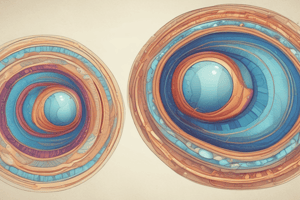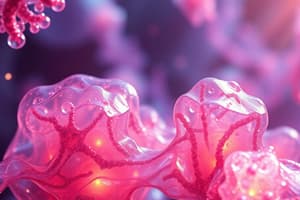Podcast
Questions and Answers
An action potential is a trnasient, regenerative electrical impulse in which the membrane potential(Vm) rapidly rises to a peak about 100 mV more positive than the normal, negative resting voltage.
An action potential is a trnasient, regenerative electrical impulse in which the membrane potential(Vm) rapidly rises to a peak about 100 mV more positive than the normal, negative resting voltage.
True (A)
What cells does an action potential occur in?
What cells does an action potential occur in?
- electrically excitable; communicates action (correct)
- electrically exhausted; communicates loss of energy
- physically active
- physically exhausted
The key to action potentials is voltage-gated channels that open and close based on changes in Vm.
The key to action potentials is voltage-gated channels that open and close based on changes in Vm.
True (A)
What kind of action potential do nerve and skeletal muscle have?
What kind of action potential do nerve and skeletal muscle have?
What kind of action potential does the heart have?
What kind of action potential does the heart have?
A stimulus is small ion movements across the membrane that depolarize Vm.
A stimulus is small ion movements across the membrane that depolarize Vm.
What causes an AP to be triggered?
What causes an AP to be triggered?
What phase is Vm decaying back to resting potential?
What phase is Vm decaying back to resting potential?
Threshold triggers action potential!!!!!!!
Threshold triggers action potential!!!!!!!
What are the action potential phases controlled by?
What are the action potential phases controlled by?
Changes in what opens and closes specific channels?
Changes in what opens and closes specific channels?
What is an absolute refractory period?
What is an absolute refractory period?
Relative Refractory Period
Relative Refractory Period
What is the voltage gated structure like?
What is the voltage gated structure like?
What is special about the voltage-sensor?
What is special about the voltage-sensor?
What "S" helix makes up part of the P-region(pore)?
What "S" helix makes up part of the P-region(pore)?
The pore region is where inhibitors block and bind. They provide selectivity for ion type.
The pore region is where inhibitors block and bind. They provide selectivity for ion type.
How many units come together to form a channel?
How many units come together to form a channel?
What is electrotonic conduction?
What is electrotonic conduction?
Active Zone
Active Zone
What could cause a decrease in the probability of firing an AP?
What could cause a decrease in the probability of firing an AP?
What are the two strategies to fix resistance and leaks in membrane ion channels?
What are the two strategies to fix resistance and leaks in membrane ion channels?
The membrane and distance are resistors.
The membrane and distance are resistors.
Myelination
Myelination
MS
MS
A patient has a defect in the number of voltage gated Na+ channels in his nerve cells. The channels are normal in every way, but there are roughly 1/2 the channels in this patients nerve cells relative to a normal patient. Compared to a patient with the normal number of Na+ channels in the nerve cells, how will the defect affect the patient's action potentials?
A patient has a defect in the number of voltage gated Na+ channels in his nerve cells. The channels are normal in every way, but there are roughly 1/2 the channels in this patients nerve cells relative to a normal patient. Compared to a patient with the normal number of Na+ channels in the nerve cells, how will the defect affect the patient's action potentials?
Flashcards are hidden until you start studying




